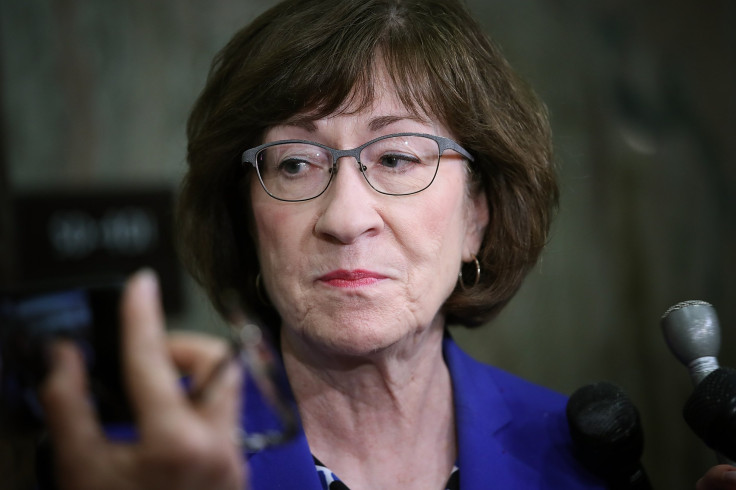As Trump Impeachment Looms, Republican Moderate Sen. Susan Collins Decides On Running For Senate

KEY POINTS
- Sen. Susan Collins, R- Maine, has decided to seek another term, promoting herself as a centrist
- Collins has been lambasted over her vote in favor of appointing Brett Kavanaugh to the Supreme Court
- Collins' challenger, Democratic state House Speaker Sara Gideon, outraised Collins in the third quarter of 2019
Sen. Susan Collins, R.- Maine, announced Wednesday that she would seek re-election in 2020. Collins is known for her centrist politics and her willingness to defy President Trump, a rare act for many Republicans.
"The fundamental question I had to ask myself in making my decision was this: In today's polarized political environment, is there still a role for a centrist who believes in getting things done through compromise, collegiality, and bipartisanship?" Collins wrote in an email to reporters. "I have concluded that the answer to this question is 'yes' and I will, therefore, seek the honor of continuing to serve as Maine's United States senator."
Collins, 67, is pro-choice and has stood up to Trump on issues such as immigration. It's unclear how she will vote in the Senate trial to convict Trump due to his dealings with Ukraine.
"I have not made up my mind," Collins told NPR. "I think it's important not to prejudge the facts of the case or the evidence that is presented," she added, saying she would be an impartial juror.
Collins has been under fire for her choice to vote in favor of Brett Kavanaugh's nomination to the U.S. Supreme Court. Palo Alto University Professor Christine Blasey Ford spoke to Congress, alleging that Kavanaugh sexually assaulted her while she was in high school.
Her vote has rallied liberals around her opponent in next year's election, Democratic Maine House Speaker Sara Gideon.
“At one point, maybe Senator Collins was different, but she doesn’t seem that way anymore: taking over a million dollars from drug companies and the insurance industry and voting to put Brett Kavanaugh on the Supreme Court," Gideon said in her campaign announcement. "I’m running for Senate because I know I can make a difference, and because Mainers deserve a senator who will always put our state first,” she said in her campaign announcement."
Gideon raised $3.2 million in the third quarter of 2019, while Collins raised $2.1 million. Collins could face an uphill battle in Maine, as her state tends to lean Democratic during presidential elections.
© Copyright IBTimes 2024. All rights reserved.





















